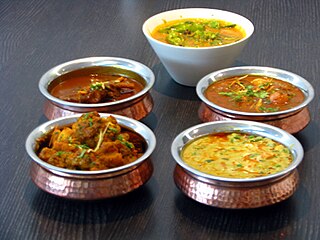
Curry is a dish with a sauce or gravy seasoned with spices, mainly associated with South Asian cuisine. It is not to be confused with leaves from the curry tree, although some curries do include curry leaves. Curry is prepared in the native cuisines of many Southeast Asian and East Asian countries.
Indian cuisine consists of a variety of regional and traditional cuisines native to the Indian subcontinent. Given the diversity in soil, climate, culture, ethnic groups, and occupations, these cuisines vary substantially and use locally available spices, herbs, vegetables, and fruits.

Rasam is a spicy South Indian soup-like dish. It is usually served as a side dish with rice. In a traditional South Indian meal, it is part of a course that includes sambar rice. Rasam has a distinct taste in comparison to sambar due to its own seasoning ingredients and is watery in consistency. Chilled prepared versions are marketed commercially as well as rasam paste in bottles.
Malvani cuisine is the standard cuisine of the South Konkan region of the Indian states of Maharashtra and Goa. Although Malvani cuisine is predominantly non-vegetarian, there are many vegetarian dishes. Although it is an independent cuisine, it overlaps Maharashtrian cuisine and Goan cuisine. Malvan is a town in the Sindhudurg district on the west coast of Maharashtra.
Maharashtrian or Marathicuisine is the cuisine of the Marathi people from the Indian state of Maharashtra. It has distinctive attributes, while sharing much with other Indian cuisines. Traditionally, Maharashtrians have considered their food to be more austere than others.
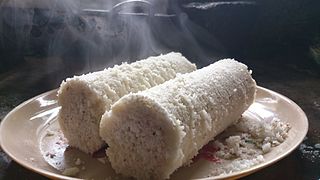
Puttu, also called pittu, is a dish native to the Southern Indian states of Kerala, Tamil Nadu, and parts of Karnataka, as well as Sri Lanka. It is made of steamed cylinders of ground rice layered with coconut shavings, sometimes with a sweet or savory filling on the inside. Puttu is usually a breakfast dish served hot with either sweet side dishes such as palm sugar or banana, or savoury with chana masala, chutney, rasam, or meat curries.

An appa or hoppers is a type of thin pancake originating from South India and Sri Lanka. It is made with fermented rice batter and coconut milk, traditionally cooked in an appachatti, a deep pan similar in shape to a wok. It is part of Tamil cuisine and Kerala cuisine found in the Indian states of Tamil Nadu and Kerala, and in Sri Lanka. Appam is most frequently served for breakfast or dinner, often with a topping such as an egg.

Kerala cuisine is a culinary style originated in the Kerala, a state on the southwestern Malabar Coast of India. Kerala cuisine offers a multitude of both vegetarian and non-vegetarian dishes prepared using fish, poultry and red meat with rice as a typical accompaniment. Chillies, curry leaves, coconut, mustard seeds, turmeric, tamarind, asafoetida and other spices are also used in the preparation.

Dahi puri is an Indian snack food which is especially popular in the state of Maharashtra. The dish is a type of chaat and originates from the city of Mumbai. It is served with mini-puri shells (golgappa), which are also used for the dish pani puri. Dahi puri and pani puri chaats are often sold by the same vendor.
Konkani cuisine is the cuisine of the Saraswat Brahmins from the Konkan region on the western coast of India. Konkani cuisine differs within the Saraswat Brahmin subsects and within the Konkan-Canara region. Konkani cuisine originally hails from the Konkan region including Uttara Kannada, Udupi district, Dakshina Kannada, Damaon, and Goa, India. Konkani cuisine is popular served in many restaurants throughout the western coast of India, and especially in the cities of Bombay and Bangalore. Each variation has its unique flavour and makes uses of different vegetables and fruits available in the region. Konkani cuisine is usually pesco-vegetarian, except acharyas and purohits who follow a strictly saatvik vegetarian diet. According the Konkani folklore, fish, meats are regarded as sea vegetables. Historically, they have refrained from eating any terrestrial animals in general.
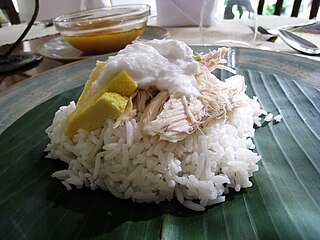
Coconut rice is a dish prepared by cooking white rice in coconut milk or coconut flakes. As both the coconut and the rice-plant are commonly found in the tropics all around the world, coconut rice, too, is found in many cultures throughout the world, spanning across the equator from Southeast Asia, the Indian subcontinent, South America, Central America, West Africa, East Africa, the Caribbean and Oceania.
Goan cuisine consists of regional foods popular in Goa, an Indian state located along India's west coast on the shore of the Arabian Sea. Rice, seafood, coconut, vegetables, meat, bread, pork and local spices are some of the main ingredients in Goan cuisine. Use of kokum and vinegar is another distinct feature. Goan food is considered incomplete without fish.

Sabudana khichri is an Indian dish made from soaked sabudana. It is the dish of choice when an individual observes a fast during Shivratri, Navratri, or a similar Hindu religious occasion.

Misal, is a very popular spicy dish in the Western Indian state of Maharashtra. The dish is mostly eaten for breakfast or as a midday snack or sometimes as a one-dish meal, often as part of misal pav. It remains a favourite snack since it is easy to make with affordable ingredients and has a good nutritional value. The taste of misal ranges from mildly to extremely spicy. And there are a lot of varieties as well. Misal is also a popular traditional food of Maharashtra. The dish is always served hot.
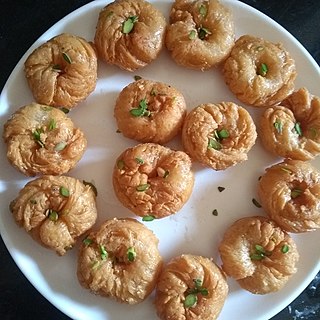
Makhan Bada is a traditional dessert originating from the Indian subcontinent. It is also known as Balusaahi and is similar to a glazed doughnut in terms of Ingredients, but differs in texture and taste. Makhan Bada also resembles Rajasthani Baati in terms of size & preparation but resembles more with Medu Vada in terms of shape. In South India, a similar pastry is known as badusha.
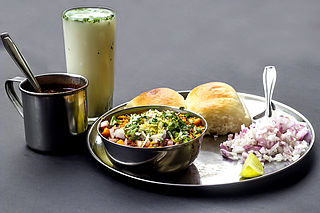
Misal pav is a dish from the Indian state of Maharashtra. It consists of misal and pav. The final dish is topped with farsan or sev, onions, lemon and coriander (cilantro). It is usually served hot with bread or rolls toasted with butter and buttermilk or dahi and papad. It is served as a breakfast dish, as a snack and also as a full meal.
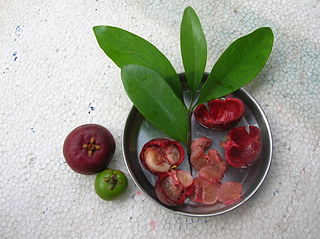
Garcinia indica, a plant in the mangosteen family (Clusiaceae), commonly known as kokum, is a fruit-bearing tree that has culinary, pharmaceutical, and industrial uses. It grows primarily in India's Western Ghats: in the states of Maharashtra, Goa, Karnataka and Kerala. It is considered as an endemic species to the Western ghats and forests in India.

Kachumber, or cachumber, is a salad dish in Indian cuisine consisting of fresh chopped tomatoes, cucumbers, onions, unripe mangoes, lemon juice, and sometimes, chili peppers. Its regional variation in south India is known as Kosambari. Sometimes, raita, a similar dish made with curd, is also called kachumber.
















